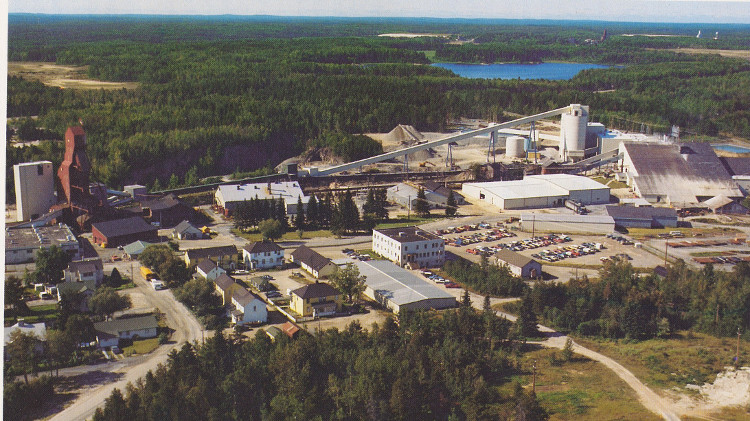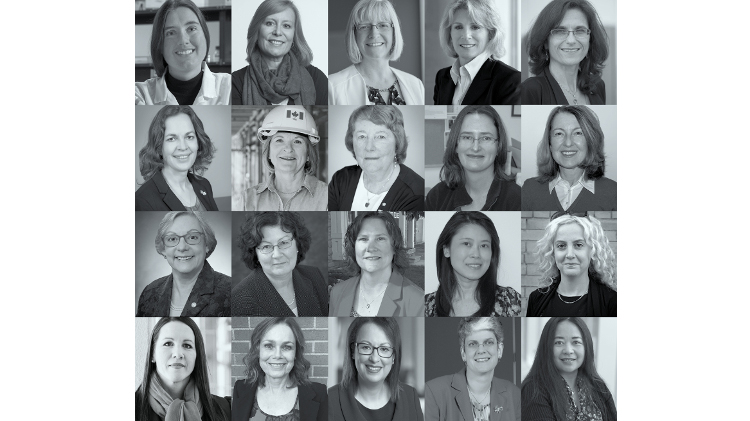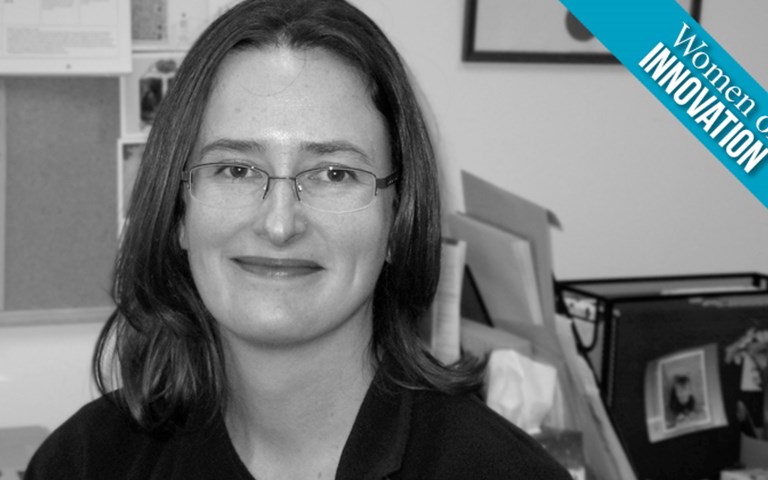Valerie Orsat is working toward increasing the quality of communication between academics in food engineering and the food industry. Courtesy of Valerie Orsat.
Valérie Orsat is chair and associate professor in the Department of Bioresource Engineering at the Macdonald Campus of McGill University. She is an internationally-recognized expert in the area of functional foods and nutraceuticals in the field of global food security and safety challenges. Her current research explores the development of processing methods for enhanced production, extraction, and encapsulation of bioactive compounds for functional foods. Prior to joining McGill as a faculty member, Valérie co-ordinated the training activities of two international developmental projects with the Canadian International Development Agency, the International Development and Research Council of Canada, and the Development of Humane Action Foundation in post-harvest engineering. She has also been an award-winner and proud member of the Canadian Society for Bioengineering.
What attracted you to agricultural engineering? I was reading the French version of National Geographic, called Geo, in maybe 1985 or 1986, just before I decided to apply to engineering. They had a whole section on the future of agriculture. It discussed what advances would be required to feed the planet, a bit on GMOs [genetically modified organisms] but also a lot on how to reinvent how we do agriculture. I was fascinated.
You had three children before finishing your postdoctoral fellowship. How have you balanced work and family? My husband is very supportive, but he is also very busy at work so at times it is difficult. My parents helped out. My father would make meals. When I had to travel and the kids were small, my father would come and stay. Now my mom does it, although my kids are older. You develop skills to make sure you can properly feed your family and accept that you are working intensely all of the time.
What have you enjoyed most about being a professor of engineering? The mentoring of students is very rewarding. I have a tendency to take on a higher number of women than men. I have eight students and six are women. I do get a few more applications from women. I can see that they are thankful for the wisdom and guidance that I provide. My past students will come back and say, “When you told me this, it changed my life.” I would say that the female students in my group really appreciate having a woman role model in academia. Yes, it can be done. Yes, certain things will not be perfect. I keep telling them that you can’t expect everything in your life to be perfect because if you do, and you’re that busy, something is going to fail. If you’re passionate about a bunch of things, you need to give a bit of time to all of them.
What factors do you believe have led to your success? I’m a good listener. As department chair, I think that is why I am doing well, because I listen to my colleagues. I try to know where they’re at, what their situations are, and what their burdens are so that we can work together to advance.
What are your current career goals? To finish my term as department chair and then go on sabbatical. I am looking forward to that. I have multiple ideas on the backburner. Together with colleagues from Dalhousie University and the University of Saskatchewan, I am working on trying to bring together more of the research across Canada in terms of bringing entrepreneurship and innovation to the food sector. We work in all of the food engineering laboratories across the country — there aren’t that many but there are a few — on innovative food systems and we publish it and that’s it, nothing happens with the innovation. We want to make sure that there’s a better translation of what we do with the food industry. The food industry definitely wants it. In Quebec, we have a consortia of food processors, the Quebec Food Processors Association, and we’ve been in negotiation with them for over two years on a bunch of different projects to work on to meet their needs. Some of them are very innovative, so that it is going to benefit them right away in order to stay ahead of the game. With the new trade agreements, the Trans-Pacific Partnership, and any other challenge in exporting, they need to crank up their innovation pipeline. If they are a big enough food company, they have some resources in-house, but if they’re a smaller food company, they don’t necessarily. They read the literature to some extent, but they don’t know how to integrate new ingredients in their pipeline and they don’t know where to find the new ingredients that they have heard about, ingredients that would help them in terms of reducing microbial growth or improving colour and packaging, whatever their needs are. They know there is innovation out there, but they don’t know how to integrate it well into their food products. We need to have better communication with them and a better tech transfer to them.
How do you define innovation? Innovation to me means many things, either a technology or process or way of doing things, in order to improve an existing way. It can be in the procedure, the technology, the formulation, and the properties of the formulation, something that brings benefit in terms of better processing efficiency, cost/benefit ratio, or, for example, because I’m in food, better health for the consumers in terms of the nutritional value of the food we’re producing.
What makes a person an innovator? I think most engineers are innovators. Engineers are supposed to find solutions to problems, to challenges. They are supposed to make things work better. Every time you tweak something to make it work better, to improve what exists or come up with something new, you’re innovating.
Where do you believe you have been the most innovative in your research? I’m trying, in the food systems field, to develop from prior knowledge. Because I have worked in extraction from plants in China for traditional medicine and with food processing in India, I’m looking at what knowledge already exists from the past. Why were we eating this or that in our diets depending on where we were and what impact did it have on our health? Starting from past knowledge that may have been forgotten from the food industry’s perspective. There is a wealth of knowledge that is already there that is not being exploited. I think we can use it to innovate. I’ve looked, for example, at germinating or sprouting the grains before we turn them into flour. This has significant benefits for nutritional application, for targeting absorption of certain vitamins. It was traditionally done by everyone, but we stopped doing it. Maybe we need to go back and introduce that process into mainstream food production so everyone can have access to it.
How do you encourage innovation in teaching? My department has made an effort in all of the courses we teach to include demonstrations in our research labs to ensure the students get a glimpse of the latest technologies. For example, since the equipment is available in our research labs, we have introduced laboratory demonstrations to showcase HPLC [high-performance liquid chromatography] analysis and UV [ultraviolet] spectrometry so that they know there are analytical tools that they can use that can meet their needs. I think everybody in the department tries to integrate that exposure. We’re amongst the last of the departments at McGill that still have a fair amount of hands-on training at the undergraduate level. We have an engineering shop on the campus located at the farm where we teach the basics in metal working, welding, and concrete making. The students, for example, learn how to use the band saw, the drill press, and the lathe. These basics allow them to understand what the limitations will be and to appreciate that metal machining is hard work and requires careful planning. Being a boss is one thing, thinking grand is one thing, but it has to be applicable to the people that you will, in the future, be ordering machined metal pieces from. Maintaining that hands-on training is good for our program. Our students are known for being very hands-on, very practical and solution oriented. I’ve been pushing for a new fluid mechanics lab because we want to have new dimensional analysis capacity for teaching fluid mechanics. A lot of our graduates go into water management, watershed management, and dam building for hydroelectric power, so they need adequate skills and training in fluid mechanics. It’s been five years since I put this proposal in to get funding and we finally got it. We’re going to get a brand-new fluid mechanics lab.
How can we attract more women to engineering? Be a role model. The presence of women in academia is important. Women start in engineering, but they don’t necessarily stay. If they can see that there is potential for women to do well in this field, they might stay. Some women stop after two years because they see it is not an environment that they find interesting or they go on to another degree after they finish their engineering degree. A bunch of our graduates have gone into law and some even into medicine because they say, “This is not a field I am comfortable working in.” I think there is work to be done to ensure that women are valued as equals. There’s still a belief that women can’t do the same as men. They need to be encouraged that they can. I think it happens in every field, perhaps we’re more aware of it or it’s heard about more in engineering. I think there is currently about 50/50 women and men in food engineering since there are a good number of entry level jobs in food companies for food engineers. That’s equally attractive to men and women. I know a fair number of women in the food industry. The food industry is open to women, and women engineers do well there. There are certain fields in food engineering that don’t really employ a lot of women. Meat processing, for example. Not too many women want to go into that. They don’t want to be the one designing the chain-link with the hooks for the carcasses. That’s not appealing to them. But there are other fields where women are comfortable, such as environmental engineering for sure.
Do you identify as a feminist? Yes. My mom always told me that I had to make sure that I got fair and equal treatment and perhaps I would need to stand up for myself in order to get that.
How can we encourage women to pursue an engineering career? I regularly go into schools where I have an open table discussion on engineering. I find that because I am a woman some of the girls will come and talk to me more readily. I think any woman in academia that has the opportunity to go into high schools and CEGEPs should try to go at least once a year, because I think we can have an impact.
To read more about Valérie and the other Women of Innovation, purchase the book here.
Next: Jeanette Southwood is giving back to engineering
Southwood is strategizing for the future of engineering and is a role model for the next generation of engineers




